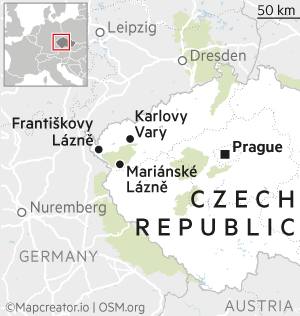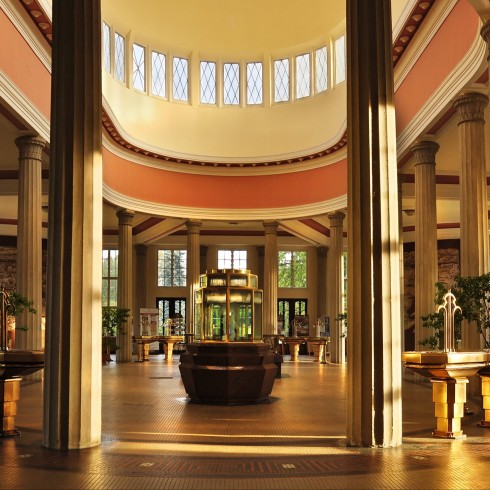Bohemian therapy: water cures and peat baths in central Europe’s spa capital
It’s not your average spa therapy. At dawn, in the Czech town of Karlovy Vary, I’m standing beside a 12 metre-high jet of hot spring water, inhaling lungfuls of the warm mist it gives off. After 10 minutes of almost meditative breathing at the aptly named Hot Spring, I move to a nearby street to join a cluster of people holding porcelain cups to collect water hissing and gurgling its way from a smaller spring. At first, the warm, acrid-tasting liquid makes me recoil but, following local advice, I sip my way through 400ml of the stuff while strolling beneath the town’s grand colonnades.
By nightfall, I will have imbibed a litre of mineral-rich water from some of the dozen public hot springs here: from the Mill Spring (apparently good for the liver and pancreas), the Freedom Spring (for the stomach) and the Charles IV Spring (kidneys). You get used to the taste after the first few mouthfuls.

Taking the waters in Bohemia was once the height of fashion, not just in Karlovy Vary, but also in Marianske Lazne and Frantiskovy Lazne, which together form the “spa triangle” in the Czech Republic’s far west. The list of former visitors reads like a European who’s who, from Peter the Great to Sigmund Freud, by way of Chopin, Wagner, Mozart and Beethoven, and writers from Goethe to Mark Twain. No wonder that in the late 19th century, Karlovy Vary, the biggest of the three towns, became known as “the largest open-air salon of Europe”.
At the Hotel President, Dr Milada Sarova extols the health-giving powers of the minerals in the water, including zinc and magnesium sulphate. “The body is 70 per cent water. If you change it with new water, you will be rejuvenated,” says the sprightly 73-year-old. Her patients have included the former leader of the Soviet Union, Mikhail Gorbachev — “He had high sugar levels in his blood; this is the best spa for diabetes”— and young people with radiation sickness from the Chernobyl nuclear disaster.
If you don’t fancy drinking the water, the spas all offer more conventional therapies. At the Hotel President, with its sauna and steam rooms, salt flotation tank and slick 15-metre pool, I enjoy a superb full-body massage, while at the Grandhotel Pupp, I opt for a relaxing herbal bath as well as heat therapy to loosen up my back. Meanwhile, there are plenty of walks to scenic lookouts in the mineral-rich air, and some seriously good restaurants in the town.

The peat is believed to alleviate pain from arthritis or rheumatism, and is even used in gynaecological treatments. My problem is still elbow pain, so I sink into a chocolate-coloured bath where 80kg of peat has been dissolved in 120 litres of water. The 15-minute soak is strangely relaxing and, when I’m decanted on to an adjacent bed to recover, I could easily fall asleep.
Though the treatments might seem outlandish to outsiders, many Czech visitors to the three towns have their stays covered by health insurance. Sadly, there’s no time to experience the hotel’s extensive indoor aqua park, nor the other more classic relaxation treatments.
Before I leave, there is one final unusual remedy to try. Back in Karlovy Vary, at the Becherovka visitor centre, I learn that the liqueur they traditionally made here from more than 20 different herbs and spices was originally marketed in 1807 for stomach aches under the name English Bitter. Although it was later commercialised as a drink by the Becher family and is now owned by Pernod Ricard, Czechs still use it to ease the stomach as well as the soul.
“We call it the 13th spring of Karlovy Vary,” smiles the museum guide as she pours me a glass. I raise my glass and take a sip. It’s strong and spicy but not at all to my taste — I’m sticking with the spa water.
Details
Jane Knight was a guest of the Grandhotel Pupp in Karlovy Vary (pupp.cz; doubles from £140), the Hotel President (hotelprezident.cz; doubles from €400), the Ensana Nove Lazne in Marinaske Lazne (ensanahotel.com; doubles from €135) and the regional tourist board (zivykraj.cz). For more general visitor information see visitczechrepublic.com
Find out about our latest stories first — follow @ftweekend on Twitter
This story originally appeared on: Financial Times - Author:Jane Knight
























